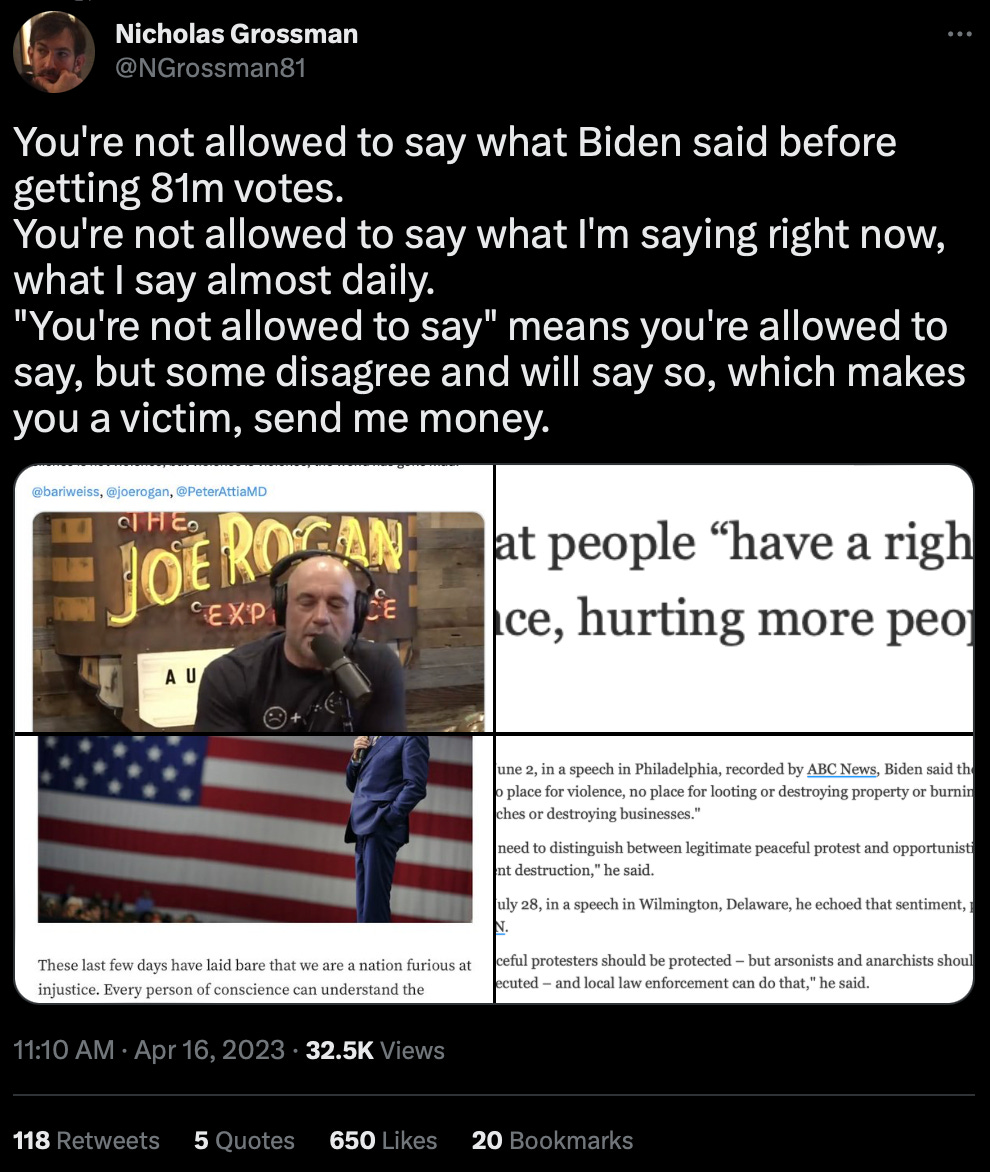Trigger Happy
Within some online communities, the capacity to offend is treated as inherently virtuous
Last month, I waded into Amy Wax discourse to argue that, while reprehensible, Wax’s words should not result in her dismissal from the University of Pennsylvania. She has tenure, and unless her detractors can show she discriminated against students of color in her evaluative capacity (as opposed to in her expressed beliefs), academic freedom ought to provide protection against being let go on account of noxious views.
While diving into the Wax saga, I came across something that rubbed me the wrong way: a podcast appearance by Amy Wax was being promoted, not for its capacity to enlighten or even to entertain, but for its capacity to provoke.
In other words, its value is supposed to derive from its ability to trigger.
Diana Fleischman’s pitch to get you to listen to her conversation with Wax is to tell you how offensive it is.
She does it twice explicitly, and a third time more subtly.
“Hear offensive views that you won’t hear anywhere else.”
“I was appalled at least three times. And that’s hard to do.”
“[W]e debate … Asians and Jews …”
I don’t think Fleischman is misunderstanding how promotion works. On the contrary, I think she gets it more than most.
Within the particular discourse subculture that Fleischman inhabits (we can include Bo Winegard, whom Fleischman is quote-tweeting), a highly-regarded intellectual virtue is the capacity to repulse the squeamish. This crowd’s version of clickbait involves emphasizing how transgressively obnoxious the guest speaker is.
Fleischman doesn’t say anything about the quality of Wax’s argumentation. What matters is that Wax is willing to be offensive—that’s the draw. Culture war belligerence as a stand-in for insightfulness and analytical rigor.
Across the various subcultures that comprise the progressive-critical center and right—the antiwoke crowd, the Intellectual Dark Web, “radical center” rationalists, science triumphalists, message board atheists, and anti-social justice types—offensiveness is sometimes treated as if it were inherently valuable.
The best defense I can give this perspective is that, in a time of seriously heavy-handed intellectual suppression, to be transgressive is to be willing to tell forbidden truths.
You might be thinking to yourself, “Well, yeah! That’s precisely the current state of things!”
It’s actually not. People—regular folks, the underclass, political dissidents, non-elites, etc.—have never had more tools at their disposal by which to speak, and with which to amplify their speech.
Which means that when an online subculture constructs its self-identity around the idea that society won’t allow us to tell the truth, when that becomes its unifying theme and rallying cry, a funny thing happens: its very success actually disconfirms its guiding insight.
We victims of digital tyranny, kept from telling the truth, our large platforms, our impressive revenue streams, our vast followerships, all of it testifying to the truth of our message that we are being intellectually suppressed.
This isn’t Solzhenitsyn being sent to the Gulag; this is Catturd2 complaining about being shadowbanned.
Recently, The Free Press tweeted a Bari Weiss quote from an appearance on Joe Rogan:
When you’re not able to say out loud and in public that there are differences between men and women, the world has gone mad. When we’re not allowed to acknowledge that rioting is rioting and it is bad, and that silence is not violence, but violence is violence, the world has gone mad.
My Arc colleague, Nicholas Grossman, pointed out that Joe Biden got 81 million votes after saying precisely the things that Weiss said couldn’t be said.
Sometimes, offensiveness isn’t a marker of intellectual courage; sometimes it’s a response to the financial incentives that animate a lot of reactionary edginess. It’s why Fleischman chose to play up Wax’s apallingness—for that crowd, Wax being affirmatively obnoxious to liberals is precisely what makes her an enticing listen.
I get that Wax is currently under professional review for saying offensive things, but that tells us nothing about whether her views are worth listening to. The inverse is also true: not being offensive has no correlation with not being interesting.
Someone is worth listening to because they’re insightful or perceptive or funny, or some other communicative virtue, not because they’re good at eliciting negative reactions. Outrage chic ultimately does a disservice to one’s own audience, because the very yardstick of success that it imposes on an article, a tweet thread, a podcast episode, is one that has no necessary correlation with the truth.
Offending people is cheap and easy—enlightening them is what should matter.






There's been a lot of folx who think the route to self-promotion is to be as edgelordy as possible. I see far too many young genre science fiction writers who go over the top with their outrageous comments in order to get attention (they think) for awards and sales. In other words, the Gamergate mentality has spread to the general public, especially in the world of pundits and opinion influencers.
Now. Was that stuff said in the past around politics? As a former political campaign worker and organizer, my response is "oh absolutely YES." Except that it was said over pizza, joints, and beer, and didn't go beyond those sitting in the room at the time. What has happened with social media is that things which were said in a casual setting with adrenaline fading from a day's activities is now part of the 24/7 connected world.
I'm tired of the edgelord wannabes. Sometimes I feel like my 23-year-old mare pinning her ears at the sparky young ones in the herd who want to push and try themselves against the older ones. But until society as a whole finds a means to draw attention away from outrage bait, we have to figure out how to handle those who offend purely to get a reaction from those who disagree with them.
That Bari quote irritates me to no end. I know professional circles are different but any time I'm with friends or out in public with people etc I say atheist one outrageous thing or witness someone else doing so.
One of my best friends has a Trans daughter. We talk about all the issues around it openly and he's not offended. I really think a lot of this is still confined to really high status professions.
Not all the time (the Palestinian refugee who's life was ruined by of his daughter's tweet comes to mind) but mostly its not something regular people are experiencing. Pushback? Sure! But censoring, losing jobs, etc? Idk anyone in that boat. And none of my friends talk about it either.